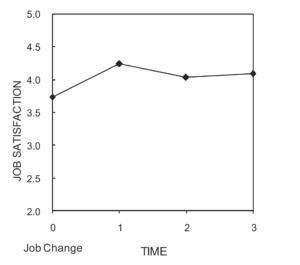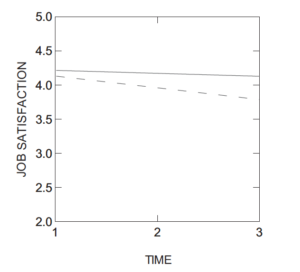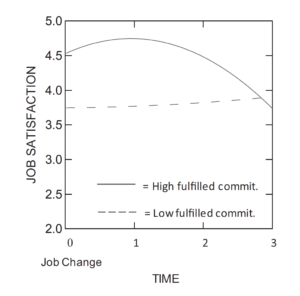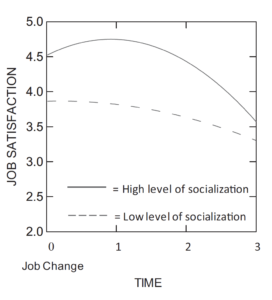Given the right circumstances, job satisfaction among new staff peaks about 3 months in, then it drops. What this means for onboarding is neither simple nor obvious.
The ‘honeymoon’ and the ‘hangover’ dynamic has a lot of explanatory power for a certain emotional journey humans take.
That journey begins with finding a new thing that we like. Swept up in joy, we feel that it’s perfect. But the feeling can’t be sustained and soon we experience a growing realisation it’s actually quite flawed. Clear-eyed, we can now assess how we truly feel.
The journey happens in romantic relationships (obviously – it’s called a honeymoon after all), but it turns out it also frequently describes changing feelings about a new job.
The funny thing about the journey is that it’s hard to avoid, even when you’re very aware it’s happening. Just ask anyone who’s been in love more than once.
One of the better research papers on this topic comes from Wendy Boswell, Abbie Shipp and Stephanie Payne from Texas A&M University and Satoris Culberston from Kansas State University. It was published in the Journal of Applied Psychology in 2009.
They checked in with over 132 newcomers in a public sector business in the US (with a budget of US $79 million and 1,500 employees) over a period of a year, and tracked how each individual’s sense of job satisfaction changed.
What made their findings so interesting was what they entailed for onboarding. The type of onboarding HR might call best in class doesn’t seem to have the effect you would think.
Is there a honeymoon?
The quick answer is yes, employees tend to experience a honeymoon period followed by a hangover.
 0 = first day | 1= three months | 2 = six months | 3 = one year
0 = first day | 1= three months | 2 = six months | 3 = one year
Source: Boswell et al. Journal of Applied Psychology 2009
It’s worth mentioning that the researchers found that 24 per cent of the variance in job satisfaction was accounted for by between-individuals variance. That is, personality differences make a difference.
New horizons
Who has the bigger honeymoon, the person whose last partner jilted them, or the person who did the dumping?
The researchers hypothesised it was the latter – that people who left their last job voluntarily (so quit and looked for new work) would have a stronger honeymoon and a worse hangover. High on their decision to do something for themselves, job leavers would begin a new role with more enthusiasm, only to crash when they realise it is not that much better.
But the research didn’t support this at all. There was no significant difference between those who quit and those who were let go.
For recruiters, that seems to suggest you a) shouldn’t expect more optimism from people who quit their role to join you, and b) shouldn’t be worried that hiring someone who was made redundant will hurt morale.
Coming out of a bad thing
If your old partner treated you like dirt, it makes sense that you would treasure a new partner who acted decently. You would overvalue being treated adequately, and have a harsher crash when you realise it is just adequate.
This was the theory of the researchers. They speculated that the same pattern (better honeymoon, worse hangover) would be true for people who hated their last job, as compared to those loved their last job.
This hypothesis was only partially supported. People who had high satisfaction with a previous job experienced essentially no honeymoon or hangover, while those who had low satisfaction elsewhere did experience a slight honeymoon in the first three months and a slight hangover afterward.

1= three months | 2 = six months | 3 = one year
Source: Boswell et al. Journal of Applied Psychology 2009
Solid line = high satisfaction with prior job
Dotted line = low satisfaction with prior job
For onboarding, this suggests it’s a good idea to pay a little extra attention to a new employee who told you they didn’t like their last job. Because chances are that their satisfaction with their new role could diminish within a year.
The power (or lack thereof) of a promise
Just as each relationship is informed by previous relationships – our new partner inevitably gets compared to old partners – we don’t come into a new job as a blank slate.
Our previous experiences of work, our values system and every step of the recruitment process all inform our assumptions.
The researchers hypothesised that if a job met the expectations of the employee, they would have a better honeymoon and hangover. It’s simple enough. If implicit and explicit promises are kept, the employee will be happier.
So they tested this, asking people whether they subjectively felt commitments (development opportunities, concern for wellbeing, etc) were fulfilled.
Turns out they were dead wrong.

0 = first day | 1= three months | 2 = six months | 3 = one year
Source: Boswell et al. Journal of Applied Psychology 2009
You can see that those who felt promises were kept had a classic honeymoon to hangover journey. Their love for the job bloomed and faded (the solid line). On the dotted line, you can see those who felt promises were broken didn’t really go on a journey at all (the minor movement upwards you see on the chart is not statistically significant).
And while the researchers stressed caution with the interpretation, it does seem that fulfilling promises resulted in a lower level of job satisfaction one year into the role. Read that last sentence again, because it shows how complex humans are. More on this in a bit.
How well do I know you?
The researchers also tested more classic onboarding stuff around orientation. This is making sure the employee knows the what, where, why and how of their new job. It can be captured with statements like: “I know where to get things”, “I know what I am required to do” and “I understand how my tasks fit into the broader mission of the company”.
The researchers reckoned that the better an organisation was at “socialisation” – their term for that orientation experience – the higher the peak of the honeymoon, and the less precipitous the hangover.
Again, it didn’t really turn out to be true.

0 = first day | 1= three months | 2 = six months | 3 = one year
Source: Boswell et al. Journal of Applied Psychology 2009
Those who felt they had a better understanding of the organisation had both a honeymoon and hangover (solid line). Those who felt they didn’t, experienced a hangover, but no honeymoon to justify it (dotted line).
According to the report, it seems that positive experiences in terms of both fulfilled commitments and socialisation perhaps serve “as a prerequisite for newcomers to experience the honeymoon and the hangover. Conversely, without these experiences, newcomers are unlikely to experience the high of the new job.”
In other words, good onboarding is a cause of the honeymoon to hangover journey. Lacklustre onboarding means employees never experience higher levels of job satisfaction. But the corollary of that is the higher you go, the more significant your crash.
What does this mean for onboarding?
You might be asking if good onboarding is worth the effort then. The answer is that of course it is. Not only did people who had that experience more job satisfaction, but later research shows they are less likely to quit.
Indeed, the more recent research, published in the Journal of Vocational Behavior in 2017, found that “extremely high social tactics” – specifically high-quality mentoring and encouraging “authentic self-expression” – can make the hangover far less severe.
AHRI offers a one day in-house course to help your company establish a mentoring program.
It’s become a standard at many organisations to have regular check-ins with new employees to track their satisfaction. What the honeymoon/hangover research shows is that those check-ins should take into account the typical emotional journey of employees. A few further points the researchers make are below:
- Around the three to six months mark is a turning point for newcomers.
- Employers shouldn’t be alarmed that job satisfaction decreases in the first year.
- You can mitigate lower satisfaction levels by addressing employee expectations and socialisation.
- If the employee is not experiencing initial high job satisfaction – if there is no honeymoon at all – chances are they feel you haven’t given them what they expected and/or you haven’t adequately conveyed the nature of their role and the workplace.
- More comprehensive socialisation, such as giving someone a mentor and a sense of where their career with your organisation could go, seems to result in a more significant honeymoon and less severe hangover.


Great story, this is really interesting research. I’d like to add that effective onboarding can help in ways other than job satisfaction. It can help in terms of speed to full productivity so the employee and their team can be “up and running” more effectively, sooner, than a poorly onboarded employee. Effective onboarding can also increase commitment to the organisation, trust in the organisation, and perceptions of organisational support. Also I suspect a well onboarded employee is likely to have greater advocacy for the organisation also. And effective onboarding is just the right thing to do. My own research in… Read more »
An interesting article, and food for thought. The on boarding process is so very important as Denise (comments here) notes regarding connecting into the organisation and team, and productivity. The research suggests that we continue to ensure an HR framework which ensures continued connections, role clarity, role value, and importantly recognising individual contributions – it’s never a hire and set and forget proposition, and we should always remind our management and team of this.
Super interesting…off to research the hangover and honeymoon theories some more!